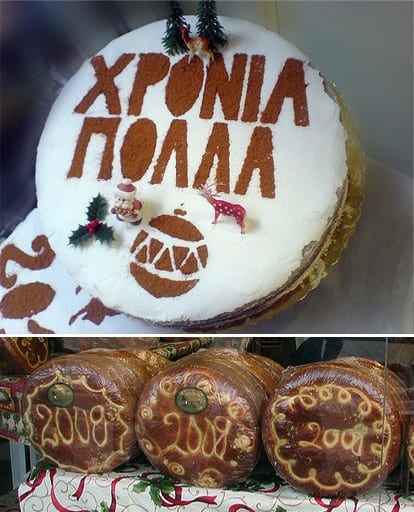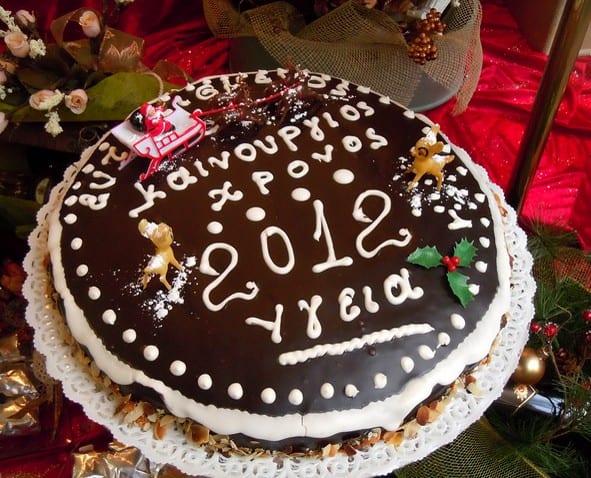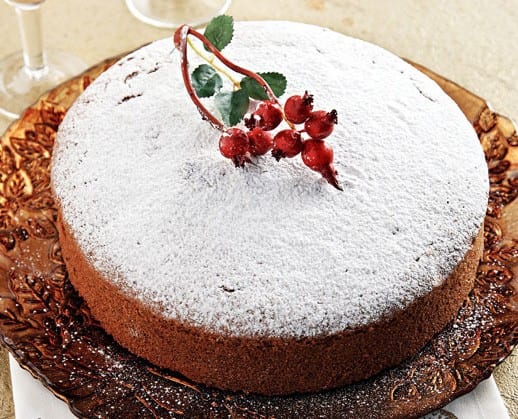Vasilopita is considered the Greek New Year's cake. It is associated with the OrthodoxSaint Basil's day on January 1 in Greece. On New Year's Day families cut the Vasilopita to bless the house and bring good luck for the new year.
It is traditional to bake a coin into the Vasilopita (St. Basil's cake). The one who receives the coin is considered to be especially blessed for the year. A piece of cake is sliced for each member of the family and any visitors present at the time. Slices are also cut for various other people or groups, depending on local and family tradition. They may include St. Basil and other saints, the Virgin Mary, the Church and the poor.
Vasilopita is made in honor of a beautiful act by St. Basil for his tax burden flock.

One year, during a time of terrible famine, the emperor levied a sinfully excessive tax upon the people of Caesarea. The tax was such a heavy burden upon the already poverty stricken people that to avoid debtors' prison each family had to give up its few remaining coins and pieces of jewelry, including precious family heirlooms. Learning of this injustice upon his flock, St. Basil the Great, the archbishop of Caesarea, took up his bishop's staff and the book of the holy Gospels and came to his people's defense by fearlessly calling the emperor to repentance. By God's grace, the emperor did repent! He canceled the tax and instructed his tax collectors to turn over to St. Basil all of the chests containing the coins and jewelry which had been paid as taxes by the people of Caesarea. But now St. Basil was faced with the daunting and impossible task of returning these thousands of coins and pieces of jewelry to their rightful owners. After praying for a long time before the icons Christ and His All-Holy Mother, St. Basil had all the treasures baked into one huge pita (bread). He then called all the townspeople to prayer at the cathedral, and, after Divine Liturgy, he blessed and cut the pita, giving a piece to each person.
Miraculously, each owner received in his piece of Vasilopita his own valuables. They all joyfully returned home, giving thanks to God who had delivered them from miserable poverty and to their good and holy bishop St. Basil the Great! In remembrance of that miracle from God as a result of St. Basil's love and defense of his people, Orthodox Christians have observed the tradition of the Vasilopita each year on January 1st.
Vasilopita from Asia Minor
This is a lovely recipe worth trying as it carries along all the flavours and tradition of Asia Minor!
Ingredients
2 cups of sugar
8 oz (226g)of butter
7 eggs
3 cup of plain flour, sieved
4 leveled teaspoons of baking powder
1 cp of almonds, ground to Powder
1 tablespoon vanilla
1/4 cup of brandy (or congac)
2 oranges (grated zest)
1 cup of milk
Method
Sieve the flour and baking powder together in a bowl. Beat the butter and sugar together until creamy. Add the eggs, one at a time, so that each egg is fully incorporated before you add the next. Add the vanilla, grated zest and brandy. Then add the almonds. Finally add the flour and the milk, a little at a time. Grease with butter and line with greaseproof paper a 30cm (12 inch) baking tin. Empty the mixture in. Add the traditional coin. Bake at 170ºC (340 F), in a well preheated oven, for approximately 1h and 10 minutes. Garnish with sieved icing sugar.


1 comments:
Hi Mela.
Would you be willing to provide more information on vasilopita to my colleague who is a recipe developer and food writer. Please let me know if she can email you.
Thank you
Post a Comment